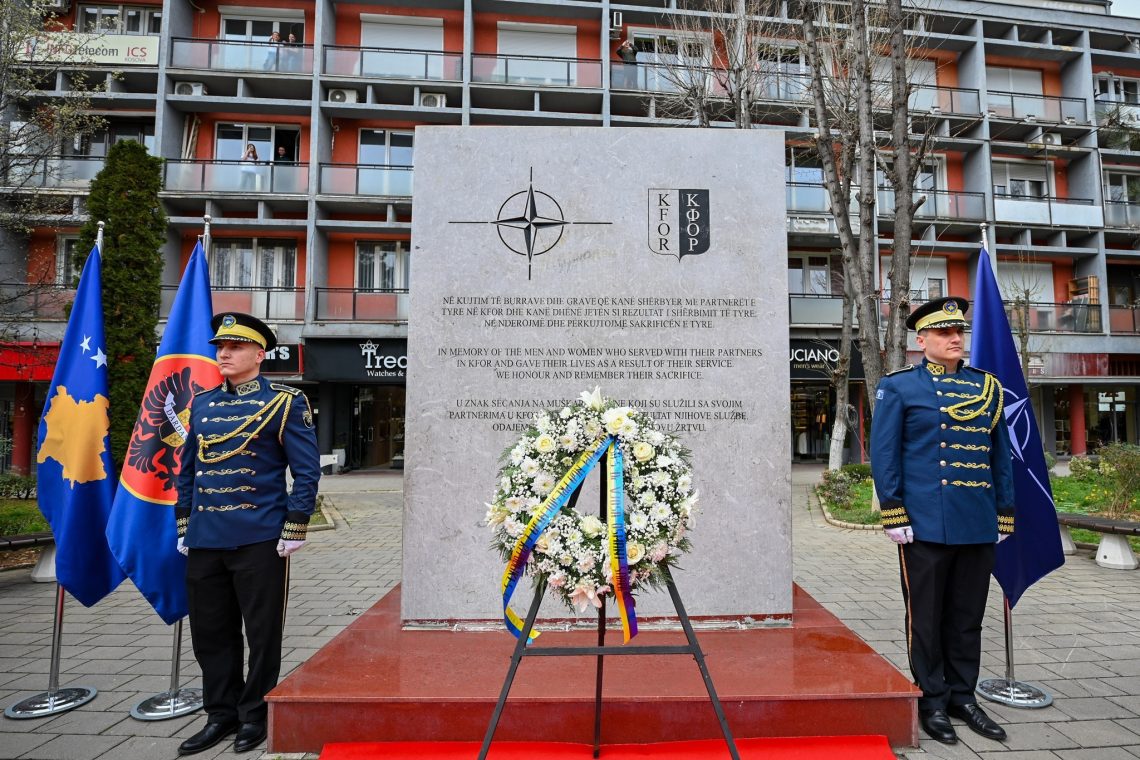U.S. diplomacy in the Western Balkans
President Trump will likely take a different policy approach than his predecessors in supporting stability in the region.

In a nutshell
- Stability in the Balkans would allow the U.S. to focus on countering China
- Peace accords from the 1990s have largely failed to bring prosperity
- Mr. Trump’s desire to serve as regional pacifier may inspire new policies
- For comprehensive insights, tune into our AI-powered podcast here
This year marked the 30th anniversary of both the Srebrenica genocide and the Dayton Peace Accords, which ended the Bosnian War in 1995. While the Western Balkans – consisting of Albania, Bosnia and Herzegovina, Kosovo, Montenegro, North Macedonia and Serbia – have avoided widespread conflict since the end of the NATO-Serbia War of 1999, many of the post-conflict aspirations for peace, security and prosperity have remained largely unfulfilled.
The United States has had a major interest in the region for some time. U.S. troops continue to support NATO’s Kosovo Force mission, and President Donald Trump intervened to deter potential escalation between Serbia and Kosovo earlier this year. The president’s desire to serve as peacemaker in the Western Balkans, expand economic opportunities there, and promote greater European stability may lead to new U.S. regional initiatives. This, in turn, would allow Washington to focus more attention and resources on the challenge of China.
External strategic pressures mount
One factor that has consistently complicated efforts to resolve issues in the Western Balkans is the strong influence of external powers. Now, particularly following the election of President Trump, these actors, and the relations between them, are undergoing significant changes that could affect new policy initiatives in the region.
Russia’s objective remains to thwart Balkan nations’ full integration into NATO and the European Union and maintain Moscow’s influence exploiting ethnic, religious and political divisions. Yet, there is no question the war against Ukraine dominates the Kremlin’s attention. As in the Southern Caucasus, Central Asia and the Middle East, states are now increasingly willing to assert their independence from Moscow’s influence, balancing any repercussions against declining Russian power. With the U.S. and Russia at loggerheads over Washington’s demand for a ceasefire in Ukraine, the White House has little motivation to care about Russia’s equities in the Western Balkans.
Turkiye continues its traditional policy of influence in the region through political and economic engagement, as well as support of Islamic cultural and religious activities. Increasingly, however, Ankara and Washington are focusing on pragmatic relations, which could serve as the basis for cooperation on matters of mutual interest in the Western Balkans.
Beijing seeks to further expand its presence in the area. Several countries are vulnerable to its influence, including Montenegro, which could fall into a debt trap due to extensive Chinese investments in its local infrastructure projects. China’s economy, however, has deep structural weaknesses and the regime is widely engaged – and perhaps overextended – globally, which may make it less willing to press its advantage in regions of marginal value.

The EU has long been bereft of initiatives to achieve progress in the Western Balkans. At present, the prospects for EU enlargement in the region appear near moribund. Washington seems open to pragmatic engagement with Brussels, but has little interest in furthering such enlargement or emboldening the European Commission and Council.
Several European nations, including Austria, Bulgaria, Croatia, Germany, Greece and Hungary continue to have traditional interests in the region. The U.S., at present, has positive and constructive ties with all these nations.
U.S. efforts to stabilize Western Balkans part of larger strategy
There is increasing awareness in Washington that effectively “pivoting to Asia” requires a more stable and secure Europe. The U.S. cannot secure its vital interests if China and Russia are able to establish an expanded and dominant sphere of influence in Western Europe. More stability in the Western Balkans would remove a potential flashpoint in the rear of NATO’s critical eastern flank. The region is also an important strategic link between Central and Southern Europe.
Facts & figures
Western Balkans timeline
1991-1995: Breakup of Yugoslavia and wars of succession
The Socialist Federal Republic of Yugoslavia disintegrated in the early 1990s, triggering a series of ethnonationalist conflicts. Slovenia and Croatia declared independence in 1991, followed by Bosnia and Herzegovina. The Bosnian War (1992-1995) was the deadliest, ending with the U.S.-brokered Dayton Accords.
1999: NATO intervention in Kosovo
In response to Serbia’s aggression against ethnic Albanians in Kosovo, NATO launched a 78-day bombing campaign against what remained of Yugoslavia, namely a joint de facto government between Serbia and Montenegro. The war ended with the withdrawal of Serbian forces and the establishment of a United Nations-administered territory in Kosovo.
2003: Thessaloniki summit
At the EU-Western Balkans Summit in Thessaloniki, the EU formally declared that the future of the Western Balkans lies within the European Union, offering a path to eventual membership for all countries in the region.
2006: Montenegro declares independence
Following a referendum, Montenegro peacefully declared independence from the State Union of Serbia and Montenegro. This marked the final dissolution of the Yugoslav federation.
2008: Kosovo declares independence
Kosovo unilaterally declared independence from Serbia in February 2008. Over 100 UN member states have recognized Kosovo, but Serbia, Russia and several others do not, making its status a continued source of regional and geopolitical tension.
The U.S. strategy for growing prosperity not only includes increased domestic production, but also partnerships and investment opportunities, particularly those that can secure additional sources for critical minerals and fortify supply chains. The deeper integration of the Western Balkans into the Western European economy could advance these goals.
Finally, President Trump’s global strategy includes playing a constructive role in mitigating regional conflicts and promoting “free and open” spaces through projects such as Central and Eastern Europe’s Three Seas Initiative, of which the U.S. is a key strategic partner. These projects give actors like China, Russia and Iran less room to maneuver and reduce the likelihood of destabilization. They also decrease the need for U.S. military presence, while simultaneously advancing opportunities for economic growth. Playing peacemaker serves both the Trump administration’s humanitarian goals and strategic interests.
Scenarios
Likely: The U.S. prioritizes Bosnia and Herzegovina over Serbia-Kosovo dispute
There are two issues that have long been a bugbear for U.S. administrations – the unresolved disagreements between Serbia and Kosovo (including the lack of recognition of Kosovo as a state by Serbia) and the future of Bosnia and Herzegovina.
Of the two issues, at present the future of Bosnia and Herzegovina appears the more acute. Any resolution on Bosnia and Herzegovina would have to accommodate the interests of both Serbia and Croatia, who view themselves as protectors of minority populations (Bosniaks, Croats and Serbs). Both countries also see the issue as critical to their national and border security. Clearly, any U.S. initiative would need to have the support of both. The prospects for a successful new effort would also benefit from the backing of Germany.
In addition, a successful U.S. initiative would need to address what some senior U.S. officials see as the underlying failures of the Dayton Accords, in particular the Office of the High Representative (OHR), an international institution created to oversee the implementation of civilian aspects of the agreement. Over the years, the office has imposed over 900 decisions affecting every aspect of civil society, achieving few positive consequences. As Max Primorac, a former U.S. official and regional expert wrote, “the country is in constant political turmoil, preventing it from progressing on social, economic, and other critical governance issues, locked in permanent inter-ethnic confrontation that threatens to split the country along ethnic lines.”
The U.S. State Department has traditionally supported the OHR despite its dismal record and the spiraling decline of political and economic solidarity among the three major ethnic groups comprising Bosnia and Herzegovina. The situation has deteriorated to the point that in 2024, the president of Croatia accused the U.S. ambassador to Bosnia and Herzegovina of “systematically disintegrating Bosnia and Herzegovina as a state.”
Further, the U.S. government has funneled massive federal aid through non-governmental organizations – aid that has often gone to unintended actors. At the core of the fiasco is that instead of implementing the Dayton Accords’ original goal of protecting the sovereignty of three equal peoples – the Bosniaks, Croats and Serbs – the OHR and U.S. strategy has sought to create a new national Bosnian “identity” that unifies all three. This effort has not only failed, but also created space for separatists to agitate and advance their own agendas.
Also likely: Trump administration cuts aid, tries to abolish OHR
Current U.S. policies are at odds. The Trump team has long eschewed the artificial exercise of nation-building, yet projects are in place that funnel millions of dollars to aid to ineffective NGOs, and State Department polices in the region do not serve U.S. interests. As a result, American policies in Bosnia and Herzegovina are ripe for review and restructuring.
The most likely scenario is that the U.S. government seeks to abolish the OHR and implement policies supporting three equal sovereign entities in Bosnia and Herzegovina. How far it could take this approach depends on the responses of the Organization for Security and Cooperation in Europe (OSCE) and the EU, both of which have supported the nation-building agenda in Bosnia and Herzegovina.
While a dramatic shift in policy might turn regional efforts in a different direction in the long term, in the short term it is unlikely to adequately address the underlying challenges in the Western Balkans, including political and ethnic divisions and economic malaise.
Contact us today for tailored geopolitical insights and industry-specific advisory services.








